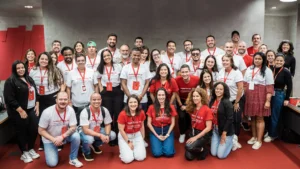The majority of Brazilians want to work from home in 2022 — how can companies reconcile expectations?
The experience with working from home during the pandemic changed the way most Brazilians view going to the office: 58% of people who are working in hybrid format prefers fully remote work in 2022, reveals the Labor Trends Index released by Microsoft in March.
The biggest motivation for workers is well-being. According to the survey, 71% of respondents in Brazil said they prioritize their health and well-being over work — a figure well above the average recorded in the 31 countries evaluated, which was 53%.
At the other end, leaders are divided on how to act: 47% already demand or plan to demand a return to in-person work and only 31% agreed on the rules and made agreements to define when their employees actually need to go to the office.
Those who do not resolve this impasse, however, may end up losing talent. “I really believe that happy people are more efficient. There are people who feel more fulfilled if they can be close to their family or offer care. Therefore, we embrace the flexibility of the work format at iFood. For many people, this is already a deal breaker: it is what will make someone accept or not work at your company”, says Gustavo Vitti, vice-president of People and Sustainability at iFood.
The CEO of Microsoft in Brazil, Tânia Cosentino, agrees with this view. “Those companies that today say: you spent two years at home and now the 'joke' is over, from next month everyone returns to the office full time will be the first to lose employees”, said the executive in an interview with CBN and the newspaper Valor Econômico.
She says that Microsoft itself adopted hybrid work. “We heard that employees do not want to return to face-to-face work because they believe that they worked so well from home for two years and today they can work for a company in Manaus or Australia from home”, says Tânia.
The ideal is to go to the office for 1 or 2 days
A Harvard Business School study evaluated data to measure the productivity and satisfaction of employees at a company in Bangladesh in 2020 and shows that the ideal is for people to be in the office one or two days a week.
The researchers found that the best performing group was the one that went from 23% to 40% of working time at the company. According to the study, these results suggest that “hybrid work can represent the best of both worlds: flexibility without isolation”.
To retain talent, therefore, whoever offers this flexibility comes out ahead. “In the past, companies had rigid molds: anyone who didn't fit in couldn't work there. Today, they can be more flexible in their policies”, says Vitti. “After all, with flexibility at work, you have happier people, and this brings more value and more results to the company.”


